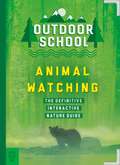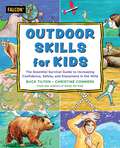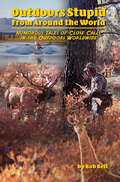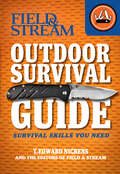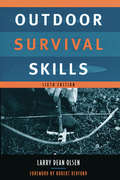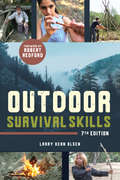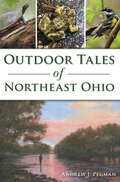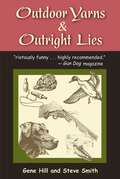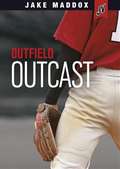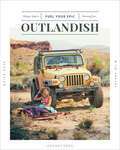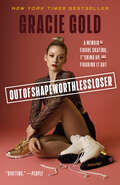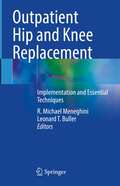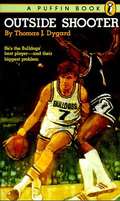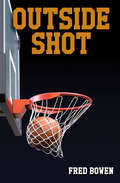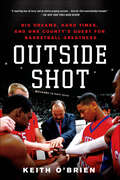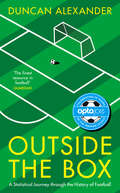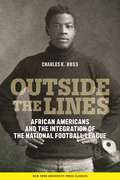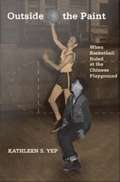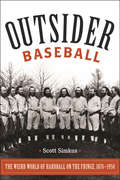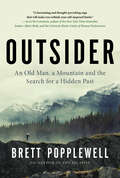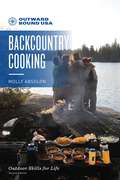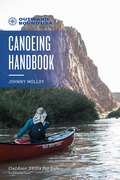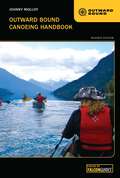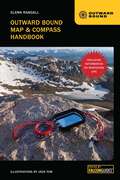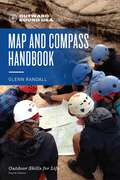- Table View
- List View
Outdoor School: The Definitive Interactive Nature Guide (Outdoor School)
by Mary Kay CarsonRewild your life! With metal corners and 448 full-color, highly illustrated pages, OUTDOOR SCHOOL: ANIMAL WATCHING is an indispensable tool for young explorers and animal lovers.Make every day an adventure with the included:- Immersive activities to get you exploring- Write-in sections to journal about experiences- Next-level adventures to challenge even seasoned nature loversNo experience is required—only curiosity and courage. This interactive field guide to animals includes:- Animal tracking- Identifying birds by silhouette, size, and color- Reading animal range maps- Bird nest spotting- Essential animal-watching gear- Identifying mammals- Bird calls and animal sounds- Finding amphibians, reptiles, and fish- Spotting scat- Recognizing eyeshine- Recording animal behaviorAnd so much more!
Outdoor Skills for Kids: The Essential Survival Guide to Increasing Confidence, Safety, and Enjoyment in the Wild (For Kids)
by Buck Tilton Christine ConnersBuck Tilton, co-founder of the Wilderness Medicine Institute and author of over 40 outdoor books, shares his decades of wilderness experience with young readers in Outdoor Skills for Kids. Partnering again with author and artist Christine Conners, this book offers over 100 important wilderness lessons including: What to do when you get lostHow to respond to wild animalsBasic first aidWays to stay positive in a survival situationOutdoor Skills for Kids is loaded with:Fun factsGamesSafety tipsInspiring true stories of kids who used these same skills successfully in survival situationsBuck and Christine are the creators of the highly successful Knots for Kids. This is the second in their series of outdoor skills books for educating young readers.
Outdoor Stupid From Around The World: Humorous Tales of Close Calls in the Outdoors Worldwide
by Bob BellOutdoor Stupid From Around The World is Bob Bell's third book. The first two were about the Alaskan adventures of Bob and his band of I.Q. challenged friends. They are titled Oh no! we're gonna die and Oh no! we're gonna die Too. The first book is mostly Bob's misadventures, and the second is about his friend's attempts to get themselves killed in the Alaska Wilderness. During his travels around the world hunting and fishing, Bob met many guides, outfitters, professional hunter and their clients. They related several stories to him, many of which are included in Outdoor Stupid. These stories show that the love of the outdoors exists everywhere your go. Also, that I.Q. challenged decisions are an international curse. Outdoor Stupid, like his other books, is also humorous, but again, it conveys the apprehension, excitement, and relief involved in life-threatening adventures. Outdoor Stupid takes the reader on adventures throughout the world with a whole new cast of characters who continue the tradition of questionable judgment and bad luck.These stories will give you an insight into the excitement and pitfalls of high-risk outdoor adventures. Several of these tales also involve a lack of intelligence or clear thinking, which definitely adds to the excitement.
Outdoor Survival Guide: Survival Skills You Need (Field & Stream)
by T. Edward Nickens The Editors of Field & StreamThe expert outdoorsmen at Field & Stream share essential survival tips and techniques in this comprehensive guide.In modern daily life, almost any information or service you could need is just a click away. But when something goes wrong in the wilderness, you have nothing but your wits to rely on—so it’s best to be prepared. Field & Stream Outdoor Survival Guide is full of skills, tips and tricks for surviving a wide range of potentially dangerous situations.This volume covers typical dilemmas, like building a fire in the rain, as well as more extreme scenarios, like skinning and cooking a snake. It also covers a few skills that are just plain awesome—like making a blowgun. Geared to the hunter or fisherman, but with something for almost everyone who loves the great outdoors, this is the book you want in your backpack before heading out into any potentially sketchy situation.
Outdoor Survival Skills
by Robert Redford Larry Dean OlsenHow to survive in almost any outdoor environment with little or no purchased equipment, relying only on what nature provides.
Outdoor Survival Skills
by Larry Dean OlsenOutdoor Survival Skills has taught generations of wilderness adventurers how to survive in nature without expensive purchased equipment, instead drawing on knowledge of the land and carefully tested techniques, many of them ancient, for finding or creating shelter, fire, tools, water, and plant and animal foods. Anecdotes from the author's lifetime of experience provide thrilling examples of the skills and attitudes that ensure survival outdoors. In this newest edition, updated text is accompanied by color photos to help both veteran and novice outdoor explorers embrace their survival skills.
Outdoor Tales of Northeast Ohio (Sports)
by Andrew J. Pegman"This is nature writing of a kind I once devoured in my youth, and it was such a pleasure to come across it again."- Patrick F. McManus, New York Times, best-selling author and columnist for Outdoor Life and Field and StreamThe fields, woods, and streams of Northeast Ohio promise no dearth of inspiration and adventure for outdoor enthusiasts. Few know this so well as Ohio native and award-winning author Andrew J. Pegman. Join him on a journey to land trophy fish, reflect on ones that got away, and embrace the beauty and freedom of the outdoors. Gain expert tips on taking up adventure fishing, flyfishing for walleyes at night on Lake Erie and for steelhead trout in the Chagrin River, and searching for elusive winter birds.This collection of classic tales captures the splendor and majesty of the outdoors and the peace and solitude to be found in Northeast Ohio and beyond.
Outdoor Yarns & Outright Lies
by Steve Smith Gene HillGuaranteed to spark memories of enjoyable time spent afield, this classic collection of stories from well-loved authors Gene Hill and Steve Smith captures the essence and humor of the outdoor life. Whether they're writing about ice fishing, calling ducks, dealing with gunsmiths, or dragging the unwilling dog to the vet, these two wits are sure to entertain. And when it comes to recalling those all-too-abundant missed shots, close calls, and ones that got away, readers might just learn a thing or two about the art of "looking at the truth from a variety of angles," as Gene Hill offers "irrefutable proof that the judgment and memory of the outdoorsman improves, like a fine wine, with time."
Outfield Outcast (Jake Maddox JV)
by Jake Maddox Eric Stevens Mike RaybouldBaseball has always been Malcolm's best sport, and he's sure this season will be no different. After all, there's no real competition when you're the best. But when a former benchwarmer makes a play for his position, Malcolm realizes that earning his spot on the baseball team won't be as easy as he expected.
Outlandish: Fuel Your Epic
by Morgan Sjogren“Besides drooling over the gorgeous photos, it is guaranteed that you will salivate over the recipes that accompany each adventure and hopefully utilize Morgan’s sustainable outdoor cooking tips.” ?American Trail Running Association Outlandish is a sun-soaked starter manual to fueling your own epic, equal parts fuel for the body and food for the soul. In this guide, the canyoneering wordsmith and adventurer Morgan Sjogren shows how outdoor adventure can become your lifestyle. Through her riveting personal stories, flavorful recipes, and the book’s gotta-go-there photographs, Sjogren shares her advice and lessons learned from years exploring the desert Southwest while living out of her canary-yellow Jeep Wrangler. Outlandish is a gorgeous guide to a more adventurous life. In Outlandish, Sjogren shows how to sleep better in a car, build a cooking fire, overcome calamity, repurpose bacon grease, leave no trace, sun-dry tomatoes on your car hood, cook food on a hot engine block, and select practical gear for your tailgate kitchen. Equipped with little more than Outlandish, a backpacking stove, a cooler, and a few staple foods, you can seek out your own adventures fueled by Sjogren’s inspiring outdoor lifestyle as well as her favorite burritos, dandelion salads, campfire blondies, and prickly pear margaritas. Sjogren offers up dozens of recipes that draw from the places she’s been?Sedona, Bears Ears, Yosemite, Silverton, Utah?and help her tell intoxicating tales of exploration and mishap. There are taco recipes remembered from the highest mountain in Mexico and “50 Shades of Burritos” with flavors taken from around the Four Corners. This smart and meaningful guide comes straight from the Utah canyon country and deserts of Arizona to share lessons learned from a life lived in wilderness. Sjogren’s exhilarating guide will stoke your desire for adventure while offering tools, tips, and tricks that can help you launch your epic.
Outofshapeworthlessloser: A Memoir of Figure Skating, F*cking Up, and Figuring It Out
by Gracie GoldNEW YORK TIMES BESTSELLER • A &“piercing account&” (The Wall Street Journal) of surviving as a young woman in a society that rewards appearances more than anything and demands perfection at all costs—especially if you&’re an Olympic figure skater. &“A riveting memoir, which details her experience with an eating disorder, depression and her high-stakes career.&”—People (Best Books to Read in February 2024) When Gracie Gold stepped onto center stage (or ice, rather) as America&’s sweetheart at the 2014 Sochi Olympics, she instantly became the face of America&’s most beloved winter sport. Beautiful, blonde, Midwestern, and media-trained, she was suddenly being written up everywhere from The New Yorker to Teen Vogue to People and baking cookies with Taylor Swift.But little did the public know what Gold was facing when the cameras were off, driven by the self-destructive voice inside that she calls &“outofshapeworthlessloser.&” In 2017, she entered treatment for what was publicly announced as an eating disorder and anxiety treatment but was, in reality, suicidal ideation. While Gold&’s public star was rising, her private life was falling apart: Cracks within her family were widening, her bulimia was getting worse, and she became a survivor of sexual assault. The pressure of training for years with demanding coaches and growing up in a household that accepted nothing less than gold had finally taken its toll.Now Gold reveals the exclusive and harrowing story of her struggles in and out of the pressure-packed world of elite figure skating: the battles with her family, her coaches, the powers-that-be at her federation, and her deteriorating mental health.Outofshapeworthlessloser is not only a forceful reckoning from a world-class athlete but also an intimate memoir, told with unflinching honesty and stirring defiance.
Outpatient Hip and Knee Replacement: Implementation and Essential Techniques
by R. Michael Meneghini Leonard T. BullerOutpatient surgery and early discharge is the hottest topic in hip and knee arthroplasty and will continue to be in the coming years: It is expected that over 50% of all hip and knee arthroplasties will be performed in the outpatient setting by 2026. Currently, a central text that encompasses all of the unique aspects of performing hip and knee arthroplasty in the outpatient setting does not exist. Furthermore, as surgeons across the US and abroad are incentivized and encouraged by government and commercial payors, as well as patients, to perform these surgical procedures in the outpatient setting, the educational material must be available to disseminate the unique perioperative and surgical strategies and techniques accordingly. This book is unique in that it will address all the essential elements and considerations to promote surgeon success in this endeavor and enhance patient safety through the transition of hip and knee arthroplasty into the outpatient setting, as well as how to implement such a program into practice. Topics discussed include patient selection, medical optimization and risk management, anesthetic surgical techniques, pain management protocols, and postoperative physical therapy. Later chapters cover practical issues surrounding outcome metrics, discharge criteria, minimizing patient readmissions, financial considerations, and additional implications for hospitals, ASCs and payers.Filling a glaring gap in the literature on this popular new topic, Outpatient Joint Replacement is an ideal resource for orthopedic surgeons, notably hip and knee specialists, as well as residents, fellows and supporting clinical staff.
Outside Shooter
by Thomas J. DygardCrazy, Deke thought again. Nobody loses their leading scorer and still is able to whip a team like this Warfield Tech outfit. Crazy, for sure. But crazy things work sometimes. The players were approaching the bench now for the final moment before the game-opening tip-off. The referee was walking toward the center of the court with the ball under his arm. Deke knelt into the circle of players. They clasped hands. "Now is the time to do it," Deke said, and he sent them onto the court....
Outside Shot (All-Star Sports Stories #21)
by Fred BowenAn eighth-grade basketball player has amazing shooting talent but could use a little team spirit in this novel “bound to engage and entertain young readers” (School Library Journal). Richie Mallon is known as “the shooter”—the one on the team who scores most of the baskets. Every day he practices at his driveway hoop, perfecting his technique. Richie never plays any other roles on the court, leaving it to his teammates to do the assisting and rebounding. Under a new coach, Richie makes the team, but isn’t given a starting position. Then, when his shooting skills fall into a slump, he must find a way to become a more well-rounded player. With over 440,000 copies sold, Fred Bowen’s Sports Story Series continues to deliver play-by-play action that’s sure to keep readers on the edge of their seats.
Outside Shot: Big Dreams, Hard Times, and One County's Quest for Basketball Greatness
by Keith O'BrienOutside Shot is the acclaimed true story of a small-town team and an American community struggling for redemption, called "a reporting tour de force" and "utterly gripping" by The New York TimesThe Cardinals of Scott County High School were beloved once--and with good reason. For years, the boys and their legendary coach gave fans in central Kentucky, deep in the heart of basketball country, just what they wanted: state titles, national rankings, and countless trips to Kentucky's one-of-a-kind state tournament, where winning and losing can change a young man's life.But in 2009, with the economy sputtering, anger rising, and Scott County mired in a two-year drought, fans had begun to lose faith in the boys. They weren't the heroes of Scott County anymore; they were "mini-athlete gods," haunted by dreams, burdened by expectations, and desperate to escape through the only means they knew: basketball.In Outside Shot, Keith O'Brien takes us on an epic journey, from the bluegrass hills and broken homes of rural America, to inner-city Lexington, to Kentucky's most hallowed hall: Rupp Arena, where high school tournament games are known to draw twenty-thousand people, and where, for the players and their fans, it feels like anything is possible.The narrative follows four of the team's top seniors and their coach as they struggle to redeem themselves in the face of impossible odds: once-loyal fans now turned against them, parents who demand athletic greatness, and scouts who weigh their every move. It delves deep inside the lives of the boys, their families, and their community--divided along lines of race, politics, religion, and sports. And it chronicles not only the high-stakes world of Kentucky basketball, but the battle for the soul of small-town America.A story of inspiration and poignancy, filled with moments of drama on and off the court, Outside Shot shows that if it's hard to win basketball games, it can be even harder to win at life itself.
Outside the Box: A Statistical Journey through the History of Football
by Duncan AlexanderIn football, numbers are everywhere. From touches in the opposition box to expected goals, clear-cut chances to win-loss ratios. In the modern game, these numbers help provide the narrative, the drama, and the conversation. They are scrutinised in order to justify results and to predict future outcomes. They even dictate transfer policy and drive clubs to achieve the impossible.But when did the numbers become so important and what do they mean?In Outside the Box, Duncan Alexander looks back at twenty-five years of the Premier League and beyond, uncovering the hidden truths and accepted myths that surround the game. Using the archives of OptaJoe and never-before-seen data, we discover why Liverpool have gone 27 years without winning a league title and why Lionel Messi is the best player in the game’s history. Or is he? Insightful, wry, and hugely entertaining, Outside the Box is an enlightening and accessible account of football across the decades, analysing data from the some of the greatest seasons, players, teams and managers.
Outside the Lines: African Americans and the Integration of the National Football League
by Charles K. RossExplores the often overlooked role of the NFL in the American civil rights movementWatching a football game on a Sunday evening, most sports fans do not realize the profound impact the National Football League had on the civil rights movement. Similarly, in a sport where seven out of ten players are Black, few are fully aware of the history and contributions of their athletic forebears. Among the touchdowns and tackles lies a rich history of African American life and the struggle to achieve equal rights.Outside the Lines traces how football laid a foundation for social change long before the judicial system formally recognized the inequalities of racial separation. Integrating teams to include white and Black athletes alike fifty years before the reversal of Plessy v Ferguson, the National Football League served as a microcosmic fishbowl of the highs and lows—the trials and triumphs—of racial integration. In this chronicle of the important stories of Black NFL athletes in the early twentieth century, Charles K. Ross has given us an important insight into the role of sports in the fight for racial justice.
Outside the Paint: When Basketball Ruled at the Chinese Playground
by Kathleen S. YepThis fascinating book reveals that Chinese Americans began "shooting hoops" nearly a century before Chinese superstar Yao Ming turned pro. Drawing on interviews with players and coaches, Outside the Paint takes readers back to San Francisco in the 1930s and 1940s, when young Chinese American men and women developed a new approach to the game--with fast breaks, intricate passing and aggressive defense--that was ahead of its time. Every chapter tells a surprising story: the Chinese Playground, the only public outdoor space in Chinatown; the Hong Wah Kues, a professional barnstorming men's basketball team; the Mei Wahs, a championship women's amateur team; Woo Wong, the first Chinese athlete to play in Madison Square Garden; and the extraordinarily talented Helen Wong, whom Kathleen Yep compares to Babe Didrikson. Outside the Paintchronicles the efforts of these highly accomplished athletes who developed a unique playing style that capitalized on their physical attributes, challenged the prevailing racial hierarchy, and enabled them, for a time, to leave the confines of their segregated world. They learned to dribble, shoot, and steal.
Outsider Baseball: The Weird World of Hardball on the Fringe, 1876–1950
by Scott SimkusWith new research and revelations that will surprise even the most ardent baseball history buffs, this engaging account tells the story of the mostly forgotten world of the mercenaries, scalawags, and outcasts who made up the independent professional ball clubs. Combining meticulous research with modern analytics, the book provides a deeper understanding of how vast and eclectic the world of professional baseball was during the first half of the 20th century. It illuminates an alternate baseball universe where Babe Ruth, Rube Waddell, and John McGraw crossed bats with the Cuban Stars, Tokyo Giants, Brooklyn Bushwicks, dozens of famous Negro league teams, and novelty acts such as the House of David and Bloomer Girls. Written in a gritty prose style, this entertaining book shares the stories of these unsung players and uses a critical lens to separate fact from fiction.
Outsider: An Old Man, a Mountain and the Search for a Hidden Past
by Brett PopplewellInto the Wild meets Born to Run meets The Stranger in the Woods in a fascinating true story of a marathon-running hermit and a journalist’s quest to solve the mystery at the core of the enigmatic man’s existenceWhen journalist Brett Popplewell first heard about Dag Aabye, an aging former stuntman who lived alone inside a school bus on a mountain, running day and night through blizzards and heat waves, he was intrigued and bewildered. Captivated by the seemingly implausible tale of a wild super-athlete aging more slowly than the rest of us, he was determined to meet the apocryphal white-haired man who was pushing the boundaries of the human mind and body beyond what anyone could dream was possible.What Popplewell witnessed on a secluded mountain perch led him on a six-year odyssey to uncover the true story of the 81-year-old man. Outsider takes readers on a remarkable journey from Nazi-occupied Norway to Argentina and British Columbia. The book chronicles how a child born under mysterious circumstances during World War II finds his way onto the big screen in Goldfinger, is heralded as the world’s first extreme skier, and is later driven into the wilderness. Both joyful and tragic, Outsider presents a bold challenge to our notions of aging, belonging and human accomplishment.
Outward Bound Backcountry Cooking (Outward Bound)
by Molly AbsolonOutward Bound Backcountry Cooking is a handy resource on the fundamentals of great trail food, including information about food preparation and storage, cooking tips for different weather, keeping food fresh, and planning and packing meals plus recipes for great outdoor meals. In partnership with outdoor leader Outward Bound, this book combines expert instruction with practical tips to ensure a fun and a satisfying meal for your next outdoor adventure.
Outward Bound Canoeing Handbook (Outward Bound)
by Johnny MolloyOutward Bound Canoeing Handbook is a handy, illustrated resource on the fundamentals of canoeing, including solid instruction on all aspects of canoeing, from types of canoes to equipment choices, paddle and on-the-water techniques, safety tips, and more. In partnership with outdoor leader Outward Bound, this book combines expert instruction with practical tips to ensure a fun and a satisfying canoe trip for your next outdoor adventure.
Outward Bound Canoeing Handbook (Outward Bound)
by Johnny MolloyOutward Bound Canoeing Handbook is a handy, illustrated resource on the fundamentals of canoeing, including solid, sound instruction on all aspects of canoeing, from types of canoes to equipment choices, paddle and on-the-water techniques, safety tips, and more. In partnership with outdoor leader Outward Bound, this book combines expert instruction with practical tips to ensure a fun and a satisfying canoe trip for your next outdoor adventure.About Outward Bound: Outward Bound is the premier provider of experience-based outdoor leadership programs for teens, adults and professionals. Outward Bound is a non-profit educational organization and expedition school that serves people of all ages and backgrounds through active learning expeditions that inspire character development, self-discovery and service both in and out of the classroom. Outward Bound excels in curricula developed for struggling teens, groups with specific health, social or educational needs and business and professional organizations.
Outward Bound Map & Compass Handbook Revised (Outward Bound)
by Glenn RandallLong recognized as one of the seminal volumes on the fundamentals of map, compass, and altimeter route finding, Outward Bound Map & Compass Handbook now includes the latest information on GPS receivers, complete with all new color illustrations. This concise guide features practical adviceon choosing the right compass, reading and using topographical maps, using an altimeter to pinpoint your position, and mastering GPS. It also helps you steer clear of the most common route-finding errors and passes on an array of tips drawn from author Glenn Randall&’s rich store of experience in the wild. Whether you are looking for a beginner course on outdoor navigation or want to sharpen your skills before heading back into the wilderness, the third edition of Outward Bound Map & Compass Handbook will prove invaluable.
Outward Bound Map and Compass Handbook (Outward Bound)
by Glenn RandallLong recognized as one of the seminal volumes on the fundamentals of map, compass, and altimeter route finding, this new edition of Outward Bound Map & Compass Handbook features practical advice on choosing the right compass, reading and using topographical maps, using an altimeter to pinpoint your position, and mastering GPS. It also helps you steer clear of the most common route-finding errors and passes on an array of tips drawn from author Glenn Randall&’s rich store of experience in the wild. Whether you are looking for a beginner course on outdoor navigation or want to sharpen your skills before heading back into the wilderness, the fourth edition of Outward Bound Map & Compass Handbook will prove invaluable.
